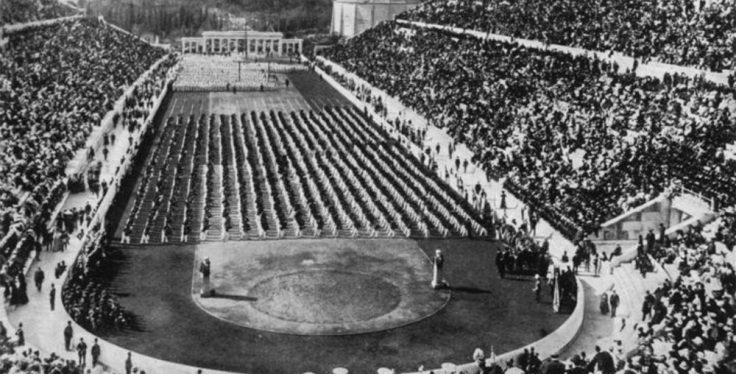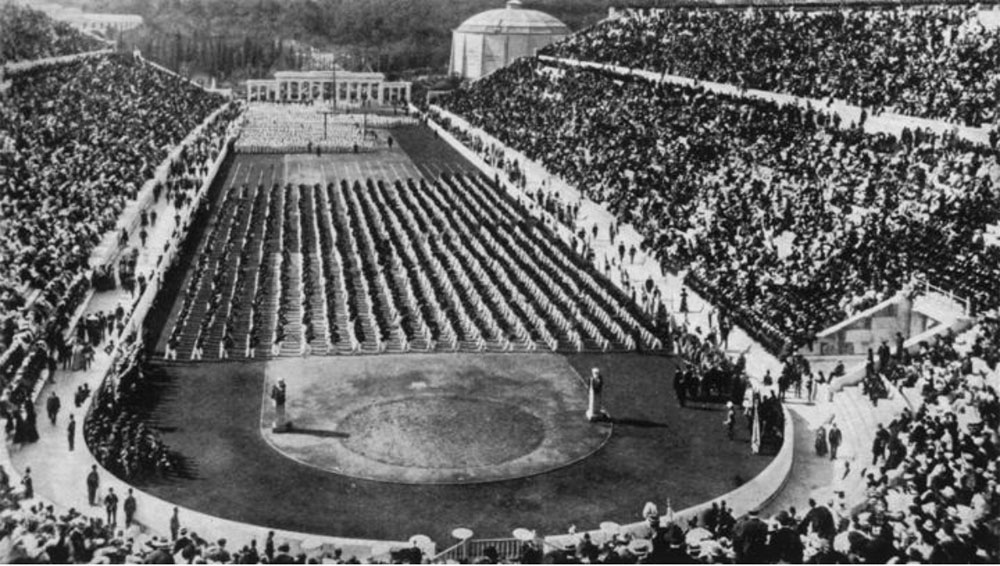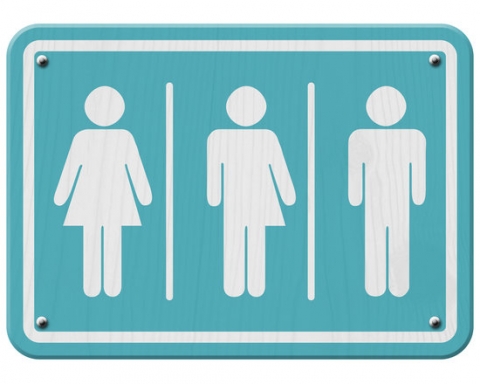After several attempts to revive the ancient Greek Olympic Games, a 2-year-old International Olympic Committee hosted the first truly international version of the games in 1896. The Games of the First Olympiad[1] served as an important stepping stone for Greece. The tiny nation had only reclaimed its independence from an aging Ottoman Empire 60 years prior. Indeed, for Greece, much of the 19th century was pockmarked with ongoing conflicts between the country’s restless citizens and an Ottoman Empire that many Greeks saw as damaging to their history and pride[2].

Photo credit: History.com
At the time, simply hosting the first, revitalized games[3] was more important for Greece than simply taking home the largest share of medals. It meant a reappearance as a major player in international politics. Greece’s standing among the Great Powers (Britain, France, Prussia, Russia and the Austrian Empire) had been tenuous at best[4]. With the exception of Russia, these countries had openly opposed Greece’s fight for independence from the Ottoman Empire. A successful Olympic Games would stand the chance to not only mend broken fences but prove to the Great Powers that Greece deserved its spot amongst them.
Fourteen nations sent eager athletes to those first Olympic Games in Athens. Some, such as Austria, Great Britain, Sweden and France, had little to prove. But for Greece and several others, there was power in presence. Nevertheless, of the 9 sports featured at these first Summer Olympic Games (athletics, cycling, gymnastics, fencing, wrestling, shooting, swimming, tennis, weightlifting) Greece came out on top with the highest medal count. In the eyes of the 13 other nations present, Greece mattered once again.
The very next year, emboldened by its place among the world’s elite, Greece engaged in a devastating war with Turkey. The Greco-Turkish War of 1897[5] ended poorly for Greece. And while it’s impossible to connect fresh Olympic pride to the country’s subsequent attempt at military conquest against a much larger adversary, it’s equally hard to ignore the reality of the seeming coincidence. Greece has never dominated the medal count again since its 1896 showing. However, that hardly matters. The country maintains its respect as a nation, not only for its pivotal role in hosting the first international Summer Olympic Games but for its continued participation in the games as well.
Rocky Growth in the Following Years
At every Olympic Games since 1896, new countries have both accepted and joined the games. In 1900, 28 nations joined[6], doubling the number from 1896. Consistent wars throughout the early 20th century kept participation rates low, however. Yet each new Olympic Games saw new countries taking up the challenge, sending, at times, as few as one athlete to compete. Case in point: The 1904 Olympic Games[7].
In 1904, The United States hosted its first ever Olympic Games. But with international travel still overwhelmingly difficult, and an on-going war[8] between Russian and Japan roiling Europe, most countries simply could not, or chose not, to participate. This resulted in a huge athlete imbalance, with the United States athlete delegation numbering 526, while the other 11 participating nations put up only 62 athletes combined. But amidst the athlete imbalance, interesting stories emerged. A belief in the spirit of cooperation that the games represent was strong enough that some countries still sent what athletes they could muster, despite political and economic challenges. This is highlighted by one sole Frenchman, Arthur Corey[9], who ran for his native France in the marathon. Oddly enough, Corey brought the wrong papers[10] and was forced to register as an American.
When Showing Up Matters
In the more than 100 years since the first Olympic Games in 1896, what was once a gathering of elite Western nations has transformed into a quadrennial meeting of nations from every continent. While the medal count still eats away a majority of the airwaves during those two weeks, the stories surrounding our shared humanity have begun to take up noticeable portions of the televised coverage. And even more than that, a solitary question has begun to emerge that with each passing Olympic Games: Which countries aren’t here?
As the 2016 Olympics come to a close, there seems to be more than one way to answer that question. Ostensibly, the answer is “None at all. Every country is represented.” Realistically, however, the story is a bit more complicated. 207 nations participated in this year’s Olympics, more than any other Olympic Games in history. Interestingly, there are only 194 wholly recognized countries[11] in the world. It is for those remaining 13 entities, and several recognized countries at the games, that presence means everything. Some will say that every country participated. And in a sense, this is true. There was at least one athlete participating in Rio from every country and political entity in the world. Yet Kuwait was banned from participating[12] due to government interference in its athletics program. And Russia nearly found its entire delegation banned[13] due to the recent doping scandal.
The Politics of Presence
The meaning of the Olympics has changed, if only subtly. Medal counts still matter. Victory still matters. We celebrate the champions, even if they aren’t from our own country. The spirit of the Olympics is, after all, a time to observe how far humans have come in breaking the barriers of the human body in a way that derives solely from spirited competition. Yet at its very core, beyond the medal counts, flags, and anthems, the Olympic Games is about presence. Presence is everything.
And many countries made resounding statements this year with their presence alone. Taiwan, forced to participate under the name “Chinese Taipei” made as bold a statement[14] as any. The country’s continued presence as an individual state continues to push the International Olympic Committee’s strict adherence to non-interference in international politics to a break point.
.@Olympics Where is “Chinese Taipei”? All I see is Taiwan! #SayNoToChinapic.twitter.com/c6j3flzcBA
— Jason (@RayquazaErk) August 17, 2016
And if the country’s citizens have their way, the country will, in some future games, be represented under the name “Taiwan” instead. That, in and of itself, would be greater than any gold medal for the country. For a country to compete under its given name is as a great a victory as any could ask for.
Yet no presence was made more important this year than the Refugee Olympic Team[15]. Theirs was a presence that stood as both a stark reprimand to their home countries and a symbolic gesture of hope. But still, it was their presence, not their individual victories, that mattered.
The #Refugee Olympic Team now has its own #flag & #anthem: https://t.co/ItL7nKVIQf#Athletes #Olympics #ROT #Sports #TeamRefugee #Rio2016
— Debnicolina (@Debnicolina) August 20, 2016
Writer, director and comedian Woody Allen is famously credited for coining the maxim[16], “80 percent of success is showing up.” Although our modern culture praises the victors at the end of the Olympic games, in many ways it’s those countries that choose to show up, or not, who make grander statements. And, in some ways, bring home a more valuable prize.
- http://www.history.com/this-day-in-history/first-modern-olympics-is-held
- http://www.theatlantic.com/international/archive/2015/07/is-greece-a-part-of-europe/397796/
- https://engineeringsport.co.uk/2012/06/26/why-are-the-olympics-important/
- http://greece.greekreporter.com/2015/03/24/the-great-powers-were-afraid-of-the-1821-greek-revolution/
- https://en.wikipedia.org/wiki/Greco-Turkish_War_(1897)
- https://en.wikipedia.org/wiki/1900_Summer_Olympics
- https://en.wikipedia.org/wiki/1904_Summer_Olympics
- https://en.wikipedia.org/wiki/Russo-Japanese_War
- http://latimesblogs.latimes.com/sports_blog/2010/08/sports-legend-revealed-a-marathon-runner-nearly-died-because-of-drugs-he-took-to-help-him-win.html
- https://en.wikipedia.org/wiki/Athletics_at_the_1904_Summer_Olympics_–_Men’s_marathon
- http://www.worldometers.info/geography/how-many-countries-are-there-in-the-world/
- https://www.washingtonpost.com/sports/olympics/kuwait-was-banned-from-the-olympics-this-is-the-human-price/2016/08/07/41f67298-5665-11e6-b7de-dfe509430c39_story.html
- https://www.washingtonpost.com/news/sports/wp/2016/07/24/ioc-decides-against-complete-ban-of-russian-team-from-rio-olympics/
- http://edition.cnn.com/2016/08/05/sport/taiwan-olympics-chinese-taipei/
- http://www.unhcr.org/news/latest/2016/8/57ba85674/historic-olympics-end-style-team-refugees.html
- http://quoteinvestigator.com/2013/06/10/showing-up/






